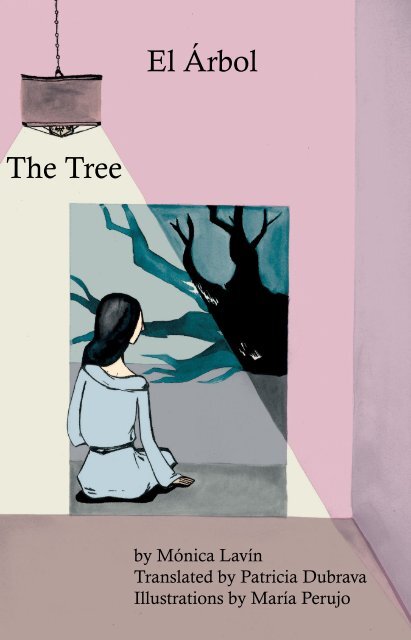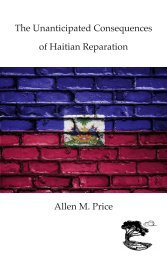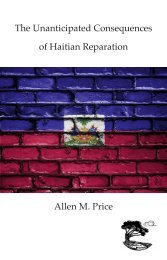You also want an ePaper? Increase the reach of your titles
YUMPU automatically turns print PDFs into web optimized ePapers that Google loves.
<strong>El</strong> Árbol<br />
<strong>The</strong> <strong>Tree</strong><br />
by Mónica Lavín<br />
Translated by Patricia Dubrava<br />
Illustrations by María Perujo
EDITOR-IN-CHIEF | LynleyShimat Lys<br />
CO-EDITOR | Sáshily Kling<br />
CO-EDITOR | Tina Togafau<br />
CO-EDITOR | Marley Aiu<br />
CO-EDITOR | Jimi Coloma<br />
CHAPBOOK EDITOR | LynleyShimat Lys<br />
ADMINISTRATIVE & TECHNICAL SUPPORT<br />
University of Hawaiʻi at Mānoa Student Media Board<br />
Mahalo nui loa to Sandy Matsui for guidance!<br />
Hawaiʻi Review logo by Bryce Watanabe<br />
Hawaiʻi Review is a publication of the Student Media Board<br />
of the University of Hawaiʻi at Mānoa. A bold, student-run<br />
journal, H\R reflects the views of its editors and contributors,<br />
who are solely responsible for its content. Hawaiʻi Review<br />
is a member of the Coordinating Council of Literary<br />
Magazines and is indexed by the Humanities International<br />
Index, the Index of American Periodical Verse, Writer’s<br />
Market, and Poet’s Market.<br />
CONTACT: hawaiireview@gmail.com<br />
SUBMIT: hawaiireview.org<br />
Copyright 2018 by Board of Publications<br />
University of Hawaiʻi at Mānoa.<br />
ISSN: 0093-9625
<strong>El</strong> Árbol | <strong>The</strong> <strong>Tree</strong><br />
Table of Contents<br />
<strong>The</strong> <strong>Tree</strong> | 5<br />
<strong>El</strong> Árbol | 17<br />
––––<br />
Author’s Note | 26<br />
Translator’s Note | 29
As it happens, sleep is interrupted in<br />
various ways. Sometimes by dreams, sometimes<br />
by noises that penetrate consciousness enough to<br />
open our eyelids. Lola woke because she thought<br />
she heard something unusual. Finding herself<br />
sitting up in bed, she stayed still, as if the rustle<br />
of her own movements would overshadow the<br />
sound that had startled her awake. She stared<br />
attentively into the darkness of the room, but<br />
the noise didn’t repeat. Looking at her husband’s<br />
head on the pillow, she envied his soft, deep-sleep<br />
breathing. Lola did not want to share this oddity<br />
with him.<br />
It was impossible to go back to sleep<br />
without seeking some explanation, so she got up.<br />
Groping in the darkness until she felt the plush<br />
texture of her robe, she put it on and went quietly<br />
to the children’s room. She only hovered at the<br />
doorway. It had happened before, especially when<br />
they had a fever or the flu, that a sudden fear<br />
woke her and she went to check on them, to peer<br />
into their little faces and cup her hand over their<br />
noses to feel the exhalation of their breath. <strong>The</strong>y<br />
were alive. Now she went down the hall barefoot<br />
and scanned the living and dining rooms. <strong>The</strong><br />
bare windows allowed the light of night to enter<br />
unobstructed; even so she flipped the switch to<br />
verify that things were in their place and there<br />
were no unexpected shadows. She’d always been<br />
afraid to turn on or shut off lights, because then<br />
7
the intruder—if there were one—would know<br />
that someone had become aware of him. But<br />
this time she looked calmly at the large armchair,<br />
the smaller one, the bookshelf in the back, the<br />
table and chairs, the china cabinet. All quiet. Her<br />
breathing began to slow down. And no further<br />
sound confirmed that what she’d heard while she<br />
slept had even happened. Could a connection<br />
in the brain make noise, a snap of chemical<br />
transmitters be heard? What happened with those<br />
surprised by a blood clot that abruptly altered<br />
their faculties? Did they hear something moments<br />
before the fatal event?<br />
Confirming that the rooms were in<br />
order gave her pleasure. It was like spying<br />
unannounced on her own home to prove she<br />
was capable of maintaining a certain state of<br />
things. For example, that they’d been able to<br />
pay the rent for a comfortable place, especially<br />
with the quantity of windows that opened on<br />
others’ gardens, giving the illusion of possessing<br />
them; that they’d furnished and decorated it and,<br />
moreover, kept it clean and neat. <strong>The</strong> kitchen<br />
faced the street. She went into it thinking the<br />
casserole could have slipped off the drain basket<br />
at the sink. Sometimes she piled dishes without<br />
putting them away. Especially at night, when she<br />
wanted to watch a movie with her husband, when<br />
the children had already been lulled to sleep<br />
with a story and she had covered them and shut<br />
8
off the light that she kept lit until then, because<br />
the oldest asked for it. <strong>The</strong> kitchen was in order<br />
and all was so quiet that it seemed as if she were<br />
alone in the house; only the profusion of glasses<br />
in the drain basket gave evidence that she lived<br />
with her family. And strangely, that sudden,<br />
disturbed waking, the resultant inspection of the<br />
rooms in silence, allowed that slice of the night<br />
to belong to her. One inhabited nights by offering<br />
sleep as a gift to darkness. But this night was hers,<br />
like when she was a teenager and the excitement<br />
of the day just concluded made her find her<br />
notebook in the chest of drawers and review the<br />
look of the boy she liked and what he had said<br />
(which she already couldn’t remember and even<br />
less write with exactness). She approximated and<br />
exaggerated the scene, but it was satisfying to<br />
replay it and feel again the hand that took hers<br />
in the movie theatre. Sleep was a hindrance that<br />
made her forget the warm and naughty sensation<br />
of complicity. She also remembered a time when<br />
she was leaving home for several months and<br />
spent the night before departure in the living<br />
room, thinking about her home, her parents,<br />
her siblings, her city. She was saying goodbye.<br />
Or how when suddenly in the night she brushed<br />
against her husband’s body and his smoothness<br />
and smell, his solidity, woke her desire to violate<br />
that, to demand an answer to her midnight<br />
appetite. Exceptions.<br />
9
This night seemed to have a border, a dark<br />
edge separating it from the light that announced<br />
night’s passing each morning. She heard a car<br />
squealing to a stop. <strong>The</strong> sound returned her<br />
to her task. It was difficult to see through the<br />
kitchen window because the sink was in the<br />
way. She went to the bathroom to look out to<br />
the street, shut off the light she’d turned on in<br />
order to see better what had happened outside.<br />
<strong>The</strong> night seemed unusually dark, except for the<br />
red taillights of the car that blinked in front of<br />
her house like an animal in danger. She went<br />
downstairs and opened the door to the wrought<br />
iron enclosed carport. She saw the car reverse,<br />
turn to go back the way it came and disappear.<br />
<strong>The</strong> streetlight was out. Again alone with the<br />
night, she now knew there was a connection<br />
between the braking car and the noise that<br />
had awakened her. Because the street seemed<br />
impenetrable, she looked then toward the carport<br />
and discovered a dark mass behind her car, as<br />
if the night had stained it with ink. She eased<br />
her way around the car, couldn’t see the cement<br />
floor, but discerned an additional blackness, an<br />
uncomfortable presence. Once close enough,<br />
she was astonished to see the leafy branch of<br />
a tree thrust through the bars of the grille and<br />
lying inside the carport. She touched a branch,<br />
ran her gaze over that giant jumble of branches<br />
straining between the bars, as if the tree were<br />
10
egging. Walking with care toward the latticed<br />
wall, avoiding branches, she felt the cold of the<br />
cement through the soles of her feet. Finally she<br />
understood. <strong>The</strong> main trunk of the tree blocked<br />
the street. It had fallen from the front sidewalk<br />
and sliced through the bars to its full length,<br />
landing nearly across the carport. A bit taller and<br />
it would have crashed into the house’s windows.<br />
Lola made out the wires on the sidewalk behind<br />
the carport; the tree had taken out the streetlight<br />
and twisted the pole to the right. <strong>The</strong>n she felt<br />
afraid of that live electricity running near her<br />
feet, from which there could be a spark to catch<br />
the tree on fire. Like many in the city, it was an<br />
ash and her street was full of trees, being an old<br />
neighborhood, but nobody thought that one of<br />
them would collapse in the middle of the night—<br />
fortunately, because it could have crushed cars,<br />
people, her and her children leaving the house.<br />
She retreated from the metal bars and took shelter<br />
under the eaves of the house, close to the top<br />
of the highest branches that now lay at her feet.<br />
She should go wake her husband, so he could<br />
see what had happened, a tree spread across the<br />
carport, a tree lying across the street. She also<br />
ought to call the police or fire department—who<br />
do you call in such a case? Not only were the<br />
wires a danger, but a car could collide with that<br />
unexpected trunk on the darkened street. But she<br />
didn’t do any of it, sat on the curb that bordered<br />
11
the garage and stayed silent. <strong>The</strong> night and that<br />
fallen tree still belonged to her. <strong>The</strong> tree was<br />
at her feet; she contemplated its destiny with<br />
sadness. She’d been invited to the mourning. And<br />
she appreciated that there weren’t condolences or<br />
volunteers who wanted to cut it into pieces, divert<br />
the traffic, extract each of the branches embedded<br />
in the metal. At least not yet. Like when Olga<br />
Knipper, Chekhov’s wife, wanted to spent the<br />
night with her dead husband in Badenweiler<br />
before telling anyone else. Lola read that in a<br />
magazine in her gynecologist’s waiting room.<br />
It was a story by a certain Raymond Carver.<br />
Although it treated Chekhov’s death, it was about<br />
the suffering of the actress he’d married four<br />
years before and about the waiter who that night<br />
had brought them three glasses of champagne. It<br />
was about the unexpected and grief. Like Olga<br />
Knipper, she wanted to spend time alone with the<br />
fallen tree that wasn’t even hers, or perhaps was<br />
hers because she saw it from the kitchen window<br />
daily although she ignored it; it was just there,<br />
stable and firm. Like the house where she lived<br />
as a girl or her father’s office where she went to<br />
visit him so often; like her parents’ marriage,<br />
fixed as a scene in a film that one day rips. She<br />
thought of the days when she opened the door<br />
to enter the house after school and the world was<br />
that house with its garden, immovable, rooted<br />
like a mountain. And the set table awaited them<br />
12
to hear the stories of their mornings between the<br />
clatter of cutlery and tortilla-wrapped meatballs.<br />
It was absurd to be thinking of meatballs and<br />
the cook who had fallen ill when she stopped<br />
working for them. That story of the solitary<br />
grieving of Knipper with the dead writer in the<br />
room, close and still warm, was different from<br />
Carver’s other stories, as she discovered when<br />
she found his books. Although not completely,<br />
because the writer knew how to put the accent<br />
on silence. And she enjoyed reading him for that.<br />
It seemed as if nothing happened between the<br />
Morgan and Myers and Webster and Stone, and<br />
what happened was exposure, fragility, solitude.<br />
This fallen tree had arrived to upset the course<br />
of the night, to caress her legs with the tender<br />
leaves of its crown. She thought of her sleeping<br />
children and how, when she read that story about<br />
the death of Chekhov they did not exist nor<br />
were even a possibility. She had just met the one<br />
who would be their father and still didn’t have to<br />
organize a domestic world. She ran her eyes over<br />
the dark branches and made out a shape, thought<br />
with horror of a rat. But rats don’t climb into<br />
trees; besides it was a still shape. A dead bird?<br />
Not long ago she had seen one under the terrace<br />
window; it seemed to have been dashed against<br />
the glass, killed by the illusion of transparency.<br />
It wasn’t just any death. She picked it up in a<br />
newspaper because she didn’t want to feel its<br />
13
temperature, to know if it was recent or cold from<br />
the hours since it had died. She leaned over the<br />
branch and made out the nest. If she had been<br />
someone who worried about animals and didn’t<br />
go around thinking to possess the night for a<br />
time, she might have taken the nest of twigs and<br />
carried it to the terrace so the little eggs it surely<br />
held would survive if the mother found them<br />
before the squirrels did. Staring fixedly, she tried<br />
to decipher the contents of the nest. She felt the<br />
wind of dawn rising and the first clarity start to<br />
lift the curtain of night.<br />
It was time to go back inside. She heard<br />
a patrol car; someone had done the right thing<br />
and called. Looking for the last time at the bulk<br />
of the uprooted tree, she imagined the increased<br />
light its absence would create in the kitchen<br />
window. That would be all that remained of that<br />
ash: a gap as memory of its shade. She closed<br />
the door behind her, and before getting back in<br />
bed next to her husband’s placid sleep, went into<br />
the children’s room and cupped her palm to feel<br />
the vapor of their breath. Calmed, she went to<br />
her bedroom. Tomorrow they would find out<br />
what happened. She would pretend surprise. She<br />
wouldn’t tell them that she was there, seated in<br />
the silence of the night, attending the wake. She<br />
would not mention that the night had been hers.<br />
14
15
16
<strong>El</strong> árbol<br />
Ocurre que el sueño se interrumpe por diferentes<br />
razones. Algunas provienen del pensamiento,<br />
otras de los ruidos que traspasan nuestros<br />
párpados. Ambas son inciertas y difusas.<br />
Lola se despertó porque creyó advertir un<br />
ruido inesperado. Se sentó en la cama y se<br />
quedó muda, como si el sonido de sus propios<br />
movimientos fuese a opacar aquella señal que la<br />
sobresaltó. Permaneció con la mirada atenta en<br />
la oscuridad de la habitación, pero el ruido no se<br />
repitió. Miró a su marido sobre la almohada, le<br />
envidió la respiración dulce del sueño profundo.<br />
No quiso compartirle esa extrañeza.<br />
Se puso de pie porque resultaba imposible<br />
vencerse sobre el colchón sin explicación alguna.<br />
Tanteó en la oscuridad hasta reconocer la textura<br />
felpuda de su bata. Se la ató al cuerpo y siguió<br />
despacio al cuarto de los niños. Asomó tan sólo<br />
por el quicio de la puerta. Ya le había sucedido<br />
que algún temor inesperado, sobre todo cuando<br />
tenían fiebre o estaban mal del estómago, la<br />
llevaba a espiarlos de noche, a acercarse a sus<br />
pequeños rostros y colocar su mano sobre la<br />
nariz para sentir el alivio de su respiración.<br />
Estaban vivos. Siguió por el pasillo descalza<br />
y oteó la sala y el comedor a la derecha. La<br />
ausencia de cortinas permitía que la luz de la<br />
noche entrara rotunda; aun así dio al apagador<br />
17
para verificar que las cosas estuvieran en su lugar<br />
y que no hubiera sombras inesperadas. Siempre<br />
que tenía miedo prendía y apagaba la luz para<br />
que el intruso —si acaso lo hubiera— supiera<br />
que alguien había advertido sus intenciones.<br />
Pero ahora miraba sin miedo el sillón largo, el<br />
más corto, los libros al fondo, la mesa rodeada<br />
de sillas a la entrada, el trastero. Todo quieto.<br />
Su propia respiración comenzaba a aquietarse.<br />
Y ningún ruido confirmaba que lo que hubiera<br />
escuchado antes mientras dormía fuera cierto.<br />
¿Sería posible que una conexión del cerebro<br />
hiciera ruido, que un chasquido de los<br />
transmisores químicos se pudiera escuchar? ¿Qué<br />
pasaba con quienes eran sorprendidos por un<br />
tapón de sangre que cambiaba bruscamente sus<br />
facultades? ¿Escuchaban algo momentos antes de<br />
la fatalidad?<br />
Confirmar que la sala estaba en orden le<br />
dio gusto. Era como espiar su casa a deshoras<br />
para comprobar que era capaz de mantener<br />
cierto estado de las cosas, que habían podido<br />
pagar la renta de un lugar grato (sobre todo<br />
por la cantidad de ventanas que se abrían a los<br />
jardines de las otras casas dándoles la ilusión de<br />
poseerlos); amueblarlo y vestirlo de los objetos<br />
de uno y otro, y encima que estuviera limpio y<br />
recogido. Entró a la cocina que daba a la calle<br />
pensando que una cacerola podía haber resbalado<br />
del escurridor al fregadero; a veces las apilaba sin<br />
18
guardarlas. Sobre todo por las noches, cuando<br />
quería ver una película en la televisión con su<br />
marido, cuando los niños ya habían sido<br />
arrullados con un cuento y los había arropado y<br />
apagado la luz que mantenía encendida, porque<br />
así lo pedía el mayor. La cocina estaba en orden<br />
y todo tan quieto que parecía que ella habitara<br />
sola esa casa; nada más la abundancia de vasos<br />
escurriendo permitía saber que ella vivía<br />
acompañada por su familia. Y extrañamente ese<br />
despertar súbito e inquieto, conforme recorría la<br />
casa en el silencio, permitía que esa hora de la<br />
casa, esa tajada de la noche, le perteneciera. Uno<br />
habitaba las noches brindando el sueño como<br />
ofrenda a la oscuridad. Pero esta noche era suya,<br />
como cuando de adolescente la excitación del día<br />
transcurrido la hacía buscar su libreta en el buró<br />
y repasar la mirada del chico que le gustaba, y lo<br />
que le había dicho (que ya no lo podía recordar<br />
y menos escribir con exactitud). Describía la<br />
escena y la exageraba, pero le satisfacía transitar<br />
por ella de nuevo y sentir la mano que atrapaba<br />
la suya en el cine. <strong>El</strong> sueño era un estorbo porque<br />
hacía olvidar la sensación cálida y traviesa de la<br />
complicidad. También recordó cuando se fue por<br />
varios meses de su casa y pasó la noche anterior<br />
a la partida en la sala, pensando en su casa, en<br />
sus padres, en sus hermanos, en la ciudad. Se<br />
despedía. O como cuando de pronto en la noche<br />
se topaba con el cuerpo de su marido y su tersura<br />
19
y su olor, y su consistencia despertaba su deseo<br />
de violentarlo, de exigir la respuesta a su apetito<br />
de medianoche. Excepciones. La noche de hoy<br />
parecía tener un borde, una frontera distinta a<br />
la de la luz del sol que anunciaba su en cada<br />
mañana. Escuchó un auto frenar con fuerza. Y el<br />
sonido la devolvió a su tarea. Era difícil mirar<br />
por la cocina porque el fregadero estorbaba. Se<br />
dirigió al baño para ver hacia la calle. Apagó la<br />
luz que había encendido para poder distinguir<br />
mejor lo que sucedía afuera. La noche le pareció<br />
inusualmente oscura, salvo por las luces rojas<br />
del auto que parpadeaban frente a su casa como<br />
animal en peligro. Echó a andar escaleras abajo y<br />
abrió la puerta que daba al garaje enrejado.<br />
Distinguió al auto que se echaba en reversa,<br />
maniobraba para tomar calle arriba y se alejaba.<br />
No había luz en el poste. Volvía a estar con la<br />
noche y ahora sabía que había una conexión<br />
entre el frenar del auto y el ruido que la había<br />
despertado. Miró entonces hacia el garaje porque<br />
la calle le parecía impenetrable, y descubrió al<br />
lado del auto allí estacionado una masa oscura.<br />
Como si se hubiera manchado de tinta la noche.<br />
Caminó esquivando su coche en el garaje. No<br />
distinguía el cemento del piso, sólo una negrura<br />
adicional, una presencia incómoda. Ya de<br />
cerca se asombró al ver la fronda de un árbol<br />
incrustada entre los barrotes de la reja y acostada<br />
en la mitad del garaje. Extendió la mano y tocó<br />
20
una rama. Recorrió a aquel gigante desvencijado<br />
con la vista, las ramas colándose entre los<br />
barrotes, como si el árbol fuese un hombre<br />
suplicante. Sintió el frío del cemento en sus<br />
plantas mientras caminaba con cuidado hacia<br />
la reja, evadiendo ramas. Por en lo entendió. <strong>El</strong><br />
fuste del árbol atravesaba la avenida. Había caído<br />
desde la acera de enfrente y se había introducido<br />
entre los barrotes de la reja para extender su<br />
largura, que topaba justa con el fondo del garaje.<br />
Si no, se hubiera incrustado en las ventanas de<br />
la casa. Lola distinguió los cables en la acera<br />
tras la reja; el árbol había vencido el alumbrado<br />
y enchuecado el poste de la derecha. Entonces<br />
sintió temor de esa electricidad viva corriendo<br />
muy cerca de sus pies, de que hubiera una chispa<br />
y el fresno se incendiara. Recordó que era un<br />
fresno como había muchos en la ciudad y que<br />
la calle donde vivía era muy arbolada por ser un<br />
barrio antiguo, y nadie pensaba que en medio de<br />
la noche (afortunadamente, porque habría podido<br />
aplastar autos, gente, a ella misma y a sus hijas<br />
saliendo de casa) se desplomara uno de ellos.<br />
Se retiró de la reja y se colocó bajo el alero de<br />
la casa, muy cerca del final de las ramas más<br />
altas que ahora yacían a sus pies. Debía entrar<br />
y despertar a su marido, que viera lo que había<br />
ocurrido, un árbol tendido en el garaje, un árbol<br />
atravesando la calle. También debía llamar a<br />
la policía, o a los bomberos, ¿a quién se llamaba<br />
21
en ese caso? No sólo los cables eran un peligro<br />
sino que cualquier coche en la noche podía<br />
estrellarse contra ese tronco inesperado. Pero no<br />
lo hizo, se sentó en la banqueta que bordeaba el<br />
garaje y se quedó en silencio. La noche todavía le<br />
pertenecía y ese árbol vencido también. Lo tenía<br />
a sus pies; contempló con tristeza su destino.<br />
Había sido invitada al duelo. Y apreció que no<br />
hubiera pésames ni voluntades que quisieran<br />
cortarlo en pedazos, menearlo con una grúa,<br />
desviar el tráfico, extraer cada una de las ramas<br />
embutidas en el metal. Por lo menos todavía no.<br />
Como cuando Olga Knipper, la mujer de Chéjov,<br />
quiso pasar la noche con su marido muerto en<br />
Badenweiler antes de avisar a los otros. Leyó<br />
aquel pasaje en una revista en el consultorio del<br />
ginecólogo. Era un cuento de un tal Raymond<br />
Carver. Aunque trataba de la muerte de Chéjov,<br />
era sobre el duelo de la actriz con quien se casó<br />
cuatro años antes y sobre el camarero que en la<br />
noche les llevó las tres copas de champaña. Era<br />
sobre lo inesperado y el duelo. Y aquí estaba<br />
ella como Olga Knipper con deseos de pasar un<br />
tiempo a solas con el árbol caído, que no era<br />
suyo ni nada, o que tal vez era suyo porque lo<br />
veía desde la ventana de la cocina todos los días<br />
aunque lo ignorara; era como esas cosas que<br />
están allí gratuitas, estables y firmes. Como la<br />
casa donde vivió de niña o la oficina de su padre<br />
a donde iba a visitarlo tan a menudo, como el<br />
22
matrimonio de sus padres, todo fijo como una<br />
escenografía que un día se rasga. Pensó en los<br />
días en que se abría la puerta para entrar a casa<br />
después de la escuela y el mundo era esa casa con<br />
jardín, inamovible, sólida como una montaña. Y<br />
la mesa puesta los esperaba a todos para escuchar<br />
el relato de sus mañanas entre el movimiento<br />
de cubiertos y las tortillas que envolvían las<br />
albóndigas. Le pareció absurdo estar pensando<br />
en albóndigas y en la cocinera que se había<br />
enfermado cuando dejó de trabajar con ellos.<br />
Aunque aquel cuento del duelo solitario de la<br />
Knipper con el escritor muerto en la habitación,<br />
cercano y todavía tibio, era distinto a los otros<br />
de Carver, como lo comprobó cuando buscó sus<br />
libros. Aunque no del todo porque el escritor<br />
sabía poner el acento en el silencio. Y ella<br />
disfrutaba leerlo por eso. Parecía que no pasaba<br />
nada entre los Morgan y Myers y Webster<br />
y Stone, y lo que pasaba era el descobijo, la<br />
fragilidad, la soledad. Este árbol caído venía a<br />
trastornarle el curso a la noche para acariciarle<br />
las piernas con las hojas tiernas de la fronda<br />
alta. Y pensó en los niños que dormían y que<br />
cuando leía aquel cuento sobre la muerte de<br />
Chéjov aún no eran un hecho o una posibilidad.<br />
Apenas había conocido a quien sería su padre<br />
y todavía no tenía que ordenar un mundo<br />
doméstico. Dejó los ojos entre el ramaje oscuro<br />
y descubrió un bulto; pensó con horror en una<br />
23
ata. Pero las ratas no andan en los árboles;<br />
además era un bulto quieto. ¿Un pájaro muerto?<br />
Se había topado hacía poco con el cuerpo<br />
de uno bajo la ventana de la terraza; parecía<br />
haberse estrellado contra el vidrio y muerto en el<br />
engaño de esa transparencia. No era cualquier<br />
muerte. Lo recogió con un periódico porque<br />
no quería sentir su temperatura, ni saber si era<br />
una muerte reciente o estaba helado por las<br />
horas transcurridas. Se inclinó hacia la rama y<br />
distinguió el nido. De haber sido alguien que se<br />
preocupara por los animales y que no anduviese<br />
pensando en poseer la noche por un rato, hubiera<br />
tomado el nido de varas y lo hubiera llevado a la<br />
terraza de su casa para que los huevecillos, que<br />
seguramente tenía, prosperaran si la madre los<br />
encontraba antes que las ardillas. Se quedó<br />
mirando fijamente para descifrar el contenido del<br />
nido. Sintió el viento de la madrugada arreciar y<br />
la primera claridad llevarse la noche.<br />
Pensó que era hora de volver a casa. Escuchó una<br />
patrulla; alguien había hecho lo correcto: avisar.<br />
Vio por última vez la estatura del árbol vencido<br />
e imaginó el aumento de luz que su ausencia<br />
provocaría en la ventana de la cocina. Eso sería<br />
todo lo que quedaría de aquel árbol: un boquete<br />
como memoria de su sombra. Cerró la puerta<br />
tras de sí, y antes de recostarse junto al plácido<br />
dormir de su marido, entró al cuarto de los niños<br />
24
y colocó su mano con suavidad para comprobar<br />
el vaho de su respiración. Sosegada, prosiguió.<br />
Mañana se enterarían de lo que había ocurrido.<br />
Fingiría sorpresa. No contaría que estuvo allí<br />
sentada en el silencio de la noche, asistiendo al<br />
duelo. Omitiría que la noche fue suya.<br />
25
Author’s Note on “<strong>The</strong> <strong>Tree</strong>”<br />
Once I saw a fallen tree in front of the house<br />
where I lived. It was night, the sudden noise<br />
and darkness unusual. I felt a certain complicity<br />
with the rare event, with the tree’s fragility, its<br />
solitude and tragedy. I lived with my husband<br />
and daughters upstairs from the shop that was<br />
my parents’ business, and the image of those<br />
branches embedded in the grating, invading a<br />
section of the parking lot, was powerful. It stayed<br />
with me. I don’t know if I wrote something in a<br />
journal then, but the truth is the event became<br />
the raw material for this story that had to be titled<br />
“<strong>The</strong> <strong>Tree</strong>.” I live in Mexico City, and the city<br />
has its own ways of speaking. It seemed to me<br />
that this was such a moment. I enjoy the idea of<br />
the extraordinary interrupting everyday life, enjoy<br />
exploring fragility, silences. And this story gave<br />
me such an opportunity.<br />
Translated by Patricia Dubrava<br />
26
<strong>El</strong> árbol<br />
Una vez vi al árbol caído frente a la casa donde<br />
yo vivía, era de noche y la oscuridad y el ruido<br />
inusuales. Es cierto que sentí una complicidad<br />
con lo inusitado, con la fragilidad del árbol, con<br />
su soledad y la tragedia. La imagen de las ramas<br />
incrustadas en la reja, invadiendo un pedazo del<br />
estacionamiento de aquella casa donde yo vivía<br />
con mi marido e hijas en la parte de arriba de<br />
una tienda que era negocio de mis padres, fue<br />
muy poderosa. Se quedó allí; no sé si escribí algo<br />
en un diario entonces, lo cierto es que pudo ser<br />
material de este cuento que tenía que tener como<br />
título “<strong>El</strong> árbol”. Vivo en la Ciudad de México,<br />
la ciudad tiene sus maneras íntimas de hablar:<br />
me pareció que este era un momento así. Me<br />
gusta la idea de lo extraordinario irrumpiendo<br />
en la vida de todos los días, me gusta explorar la<br />
fragilidad, los silencios. Y este cuento me dio la<br />
oportunidad.<br />
Mónica Lavín<br />
27
28
Translator’s Note<br />
I generally employ the Gregory Rabassa<br />
method of translation, and read stories as I’m<br />
translating them, so coming upon the Raymond<br />
Carver reference in Mónica Lavín’s “<strong>The</strong> <strong>Tree</strong>”<br />
was a pleasant surprise. I knew Ray Carver in<br />
Sacramento in 1966-1967, when I lived in a<br />
communal house steaming with political and<br />
arts activity, including the publication of an<br />
ephemeral literary magazine called <strong>The</strong> Levee. By<br />
“publication,” I mean we mimeographed the pages<br />
and sat in a circle to collate, fold and staple them.<br />
Ray provided early revision lessons, suggesting<br />
changes to a poem of mine that was to be<br />
included. I was twenty and thought poems came<br />
whole, from divine fountainheads.<br />
I had completed a first draft of “<strong>The</strong> <strong>Tree</strong>” when<br />
I visited Mónica Lavín last summer in Mexico<br />
City. Her Coyoacan living room is covered by<br />
bookshelves to which I am drawn as filings are<br />
to magnets. I immediately recognized the spine<br />
of Where I’m Calling From among the English<br />
language literature on her shelves. “You know,”<br />
I said, “your story is a kind of Carver story,<br />
an homage.” “Really?” She asked. “I hadn’t<br />
thought of that. It’s inspired by something that<br />
happened.” Much fiction is built on something<br />
that happened. And writers don’t always realize<br />
29
all the layers their work has woven. “<strong>The</strong> <strong>Tree</strong>”<br />
is a Mexican woman’s version of a Carver story:<br />
domestic, quiet, with a subtle, solitary epiphany.<br />
<strong>The</strong> challenge on first translating any writer is<br />
becoming acclimated to her vocabulary, syntax,<br />
rhythm—all the things that make up individual<br />
style. Beginning to translate Mónica Lavín was<br />
a challenging climb. Counting “<strong>The</strong> <strong>Tree</strong>,” I’ve<br />
now translated fifteen of her stories. Aspects of<br />
her writing have become familiar in the way they<br />
only can in the process of translation. <strong>The</strong>re is<br />
no closer reading of a text. As Simon Leys said,<br />
“Translation is the severest test to which a book<br />
can be submitted.” I start noticing repetitive<br />
phrasing, particular ways of putting a sentence<br />
together, become better at rendering them, at<br />
being able to say, “I know what she means and<br />
a literal translation won’t work, but I can find a<br />
way to say it in English.”<br />
By the time I returned home from Mexico last<br />
summer, “<strong>The</strong> <strong>Tree</strong>” draft had cooled, and its<br />
inadequacies surfaced, as they do with time. I<br />
completed a second draft and a third. <strong>The</strong>n, months<br />
later, before I sent it out into the world, I revised<br />
it again, the culmination of a technique I began<br />
learning from Ray Carver so many years ago.<br />
Patricia Dubrava<br />
30
31
32









